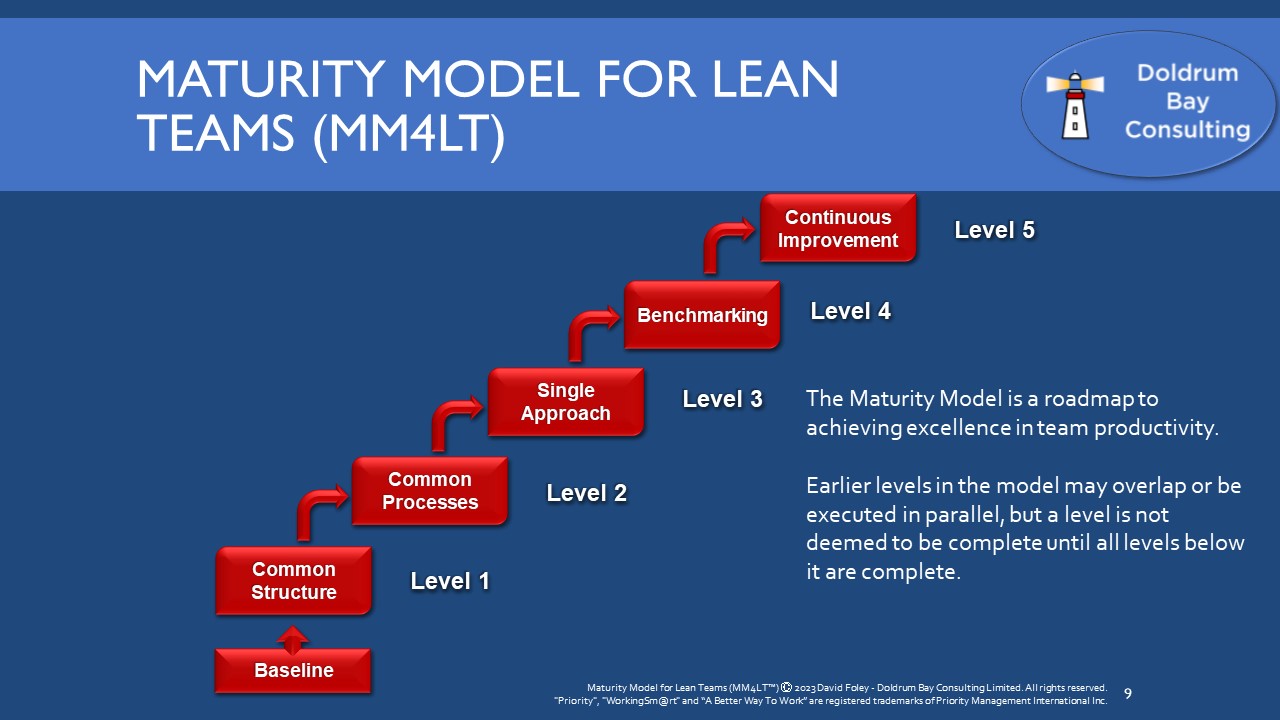Services / Maturity Models
Previous / next: Microsoft 365 Training
Using the Maturity Model for Lean Teams (MM4LT™) to improve team productivity
What is a Maturity Model?
A maturity model is a tool that helps an organisation or team to achieve required benefits from following a desirable best practice behaviour, approach or methodology (“the goal”).
Examples of a behaviour, approach or methodology could include:
- Leadership,
- Team productivity,
- Change management,
- Project management,
- Software development.
How does a Maturity Model work?
A maturity model consists of a series of levels, from low to high maturity and a roadmap to achieve the desired level of maturity.
The maturity model approach uses qualitative data to enable the organisation or team to review the desirable goal and understand:
- How they are currently performing.
- What they have to do to improve this performance and reach the goal of their desired ‘maturity’ level.
What is a Maturity Model level?
A maturity model level is a milestone that indicates how close an organisation or team is to achieving ‘maturity’ in a certain domain.
By reaching a specific level, the organisation or team can evaluate their progress and identify the areas that need further improvement. They can then plan for the next level of actions that will help them move closer to their desired goal.
NOTE. The goal may not always be the highest level in the model, but rather the one that suits the organisation or team’s needs and aspirations.
What a Maturity Model is not
A maturity model is not a ‘badge’ or a tool to compare one organisation or team with another, either internally or externally.
It is also not a guarantee that the organisation or team has achieved the desired outcomes by reaching a certain level.
Rather, the value of a maturity model lies in the process of improvement that the organisation or team undergoes.
Therefore, the journey of improvement is more important than the destination of maturity.
What is the Maturity Model for Lean Teams (MM4LT™)?
To succeed in the long term, organisations need their teams to be productive. This means that the teams need to have:
- Experience, discipline, and appropriate behaviour that reflect a high level of maturity.
- Access to and knowledge of the right tools for their tasks and activities.
- Ability to make quick and effective decisions.
Many organisations realise that adopting a lean approach to team productivity can help them achieve these requirements.
What is a Lean Team?
A lean team is a team that applies lean concepts to enhance its productivity.
Lean concepts are based on lean thinking, which aims to deliver more value by eliminating waste, increasing efficiency, and improving quality.
Lean thinking is not a one-time action, but a continuous process of learning and improvement that requires commitment and discipline.
How does the Maturity Model for Lean Teams help?
The Maturity Model for Lean Teams (MM4LT™) is a tool that helps organisations measure and improve their team productivity using lean concepts.
The MM4LT suggests that organisations can achieve many of their lean team goals by following the Priority Management WorkingSm@rt® techniques and effectively using tools such as Microsoft Teams, and related tools and processes.
The MM4LT is inspired by the Capability Maturity Model (CMM) for software development, which defines five levels of maturity for an organisation’s processes. The higher the level of maturity, the more productive the team is. It also follows the principles outlined by Dr Harold Kerzner in his book "Strategic Planning for Project Management using a Project Management Maturity Model", which is also based on the CMM model.
The MM4LT model is shown below.

White paper
For more details see the white paper presentatiion: Leveraging the Maturity Model for Lean Teams (MM4LT) for Organisational Excellence
References
- Carnegie Mellon Software Engineering Institute (1993): Capability maturity model for software. Carnegie Mellon University. Retrieved 27 May 2017, from https://www.sei.cmu.edu/reports/93tr024.pdf
- Dr Harold Kerzner: "Strategic Planning for Project Management using a Project Management Maturity Model", Publisher: Wiley, ISBN-10: 0471400394
Copyright
Maturity Model for Lean Teams (MM4LT™) by David Foley. Published by Doldrum Bay Consulting at the registered address Earlscliffe, Ceanchor Road, Baily, Howth, Co. Dublin. D13 YW62 Ireland
Copyright © 2022 David Foley. All rights reserved. No part of this publication may be reproduced, stored in any retrieval system, or transmitted in any form by any means—electronic, mechanical, photocopy, recording, or otherwise—without prior written permission of the publisher, except as provided by United States of America copyright law and fair use.
For permission requests, write to the publisher "Attention: Permissions Coordinator," at the address above.
Maturity Model for Lean Teams (MM4LT) is a trademark of David Foley.
"Priority", "WorkingSm@rt" and “A Better Way To Work” are registered trademarks of Priority Management International Inc.